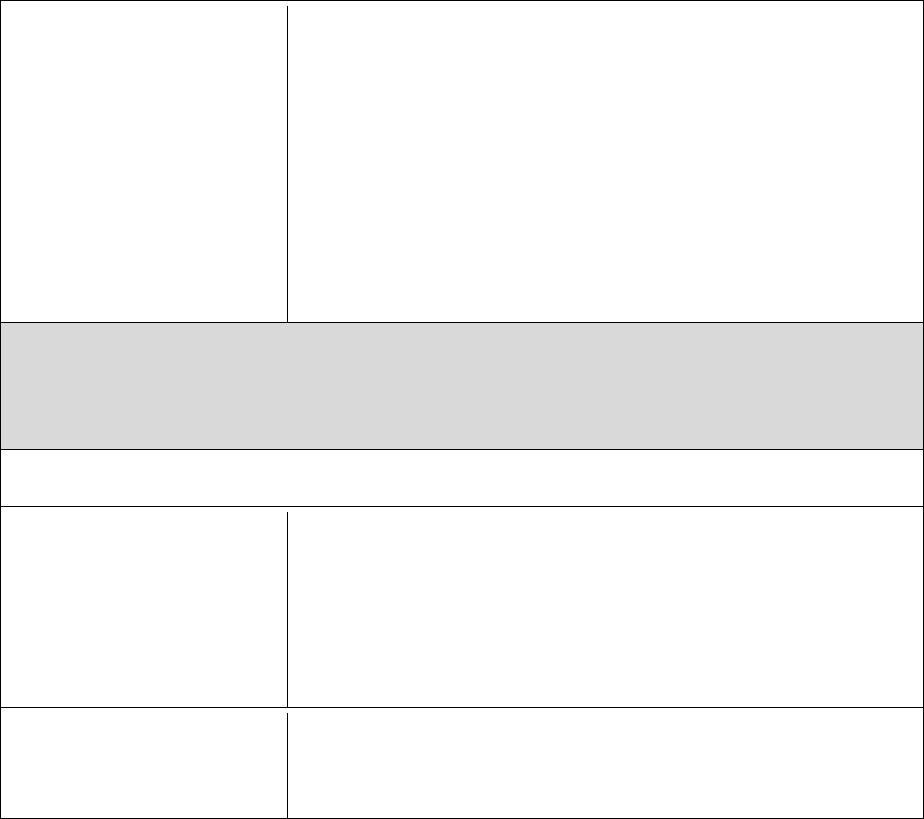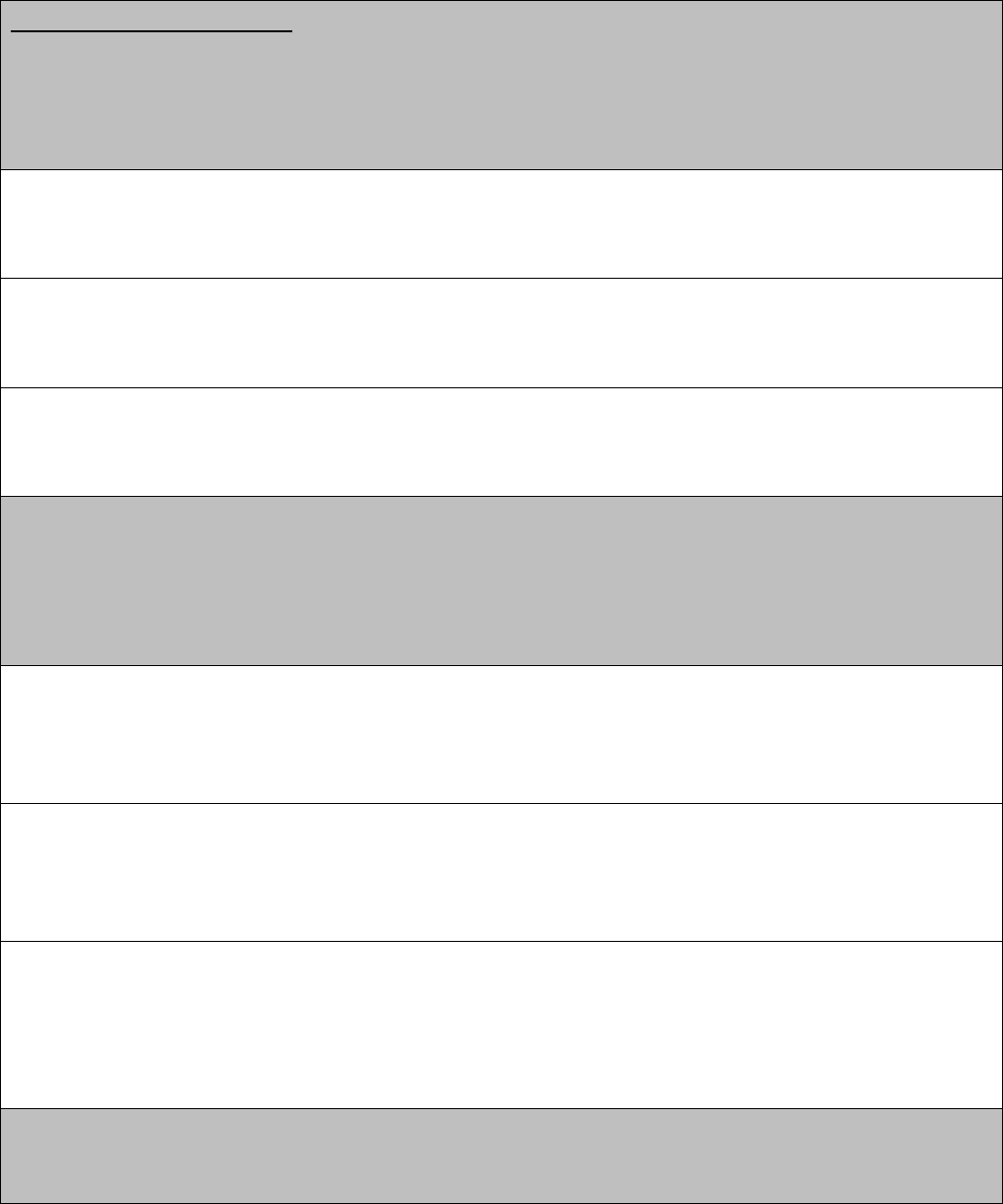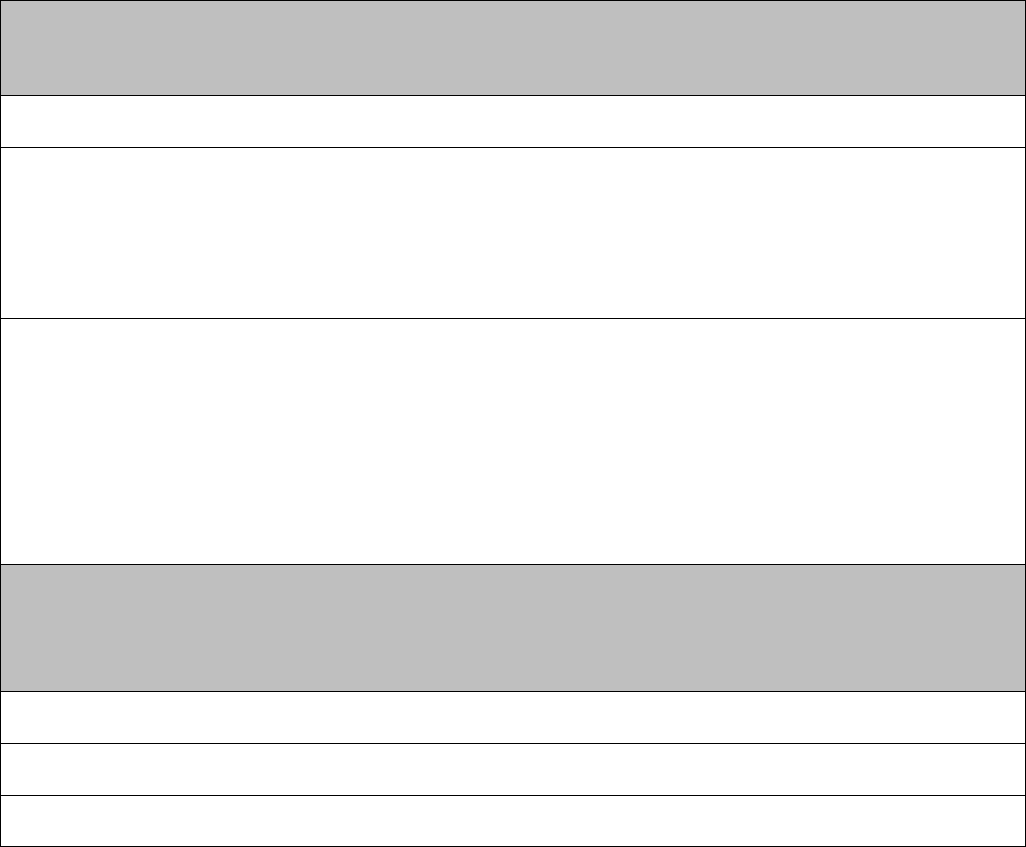
Western Carolina University
College of Education and Allied Professions
Comprehensive Education M.A.Ed. and M.A.T. Advanced Portfolio
M.A.Ed.: Elementary, English, Middle Grades, Special Education
M.A.T: STEM, Art, English, TESOL & Special Education
Definition
The Advanced Portfolio is an organized set of documents and artifacts illustrating the graduate
teacher candidate’s growth, as a self‐directed, reflective practitioner.
Rationale
The Advanced Portfolio is intended to provide evidence that the candidate has addressed each of
the Professional Education Core Themes of the graduate program. The portfolio also
acknowledges the North Carolina Standards for Graduate Teacher Candidates advanced
competencies. The portfolio is a carefully selected, organized set of entries demonstrating
achievement of each of the state standards and professional core themes.
Professional Education Core Themes
WCU’s graduate program in Comprehensive Education has identified themes important to the
development of advanced professional education knowledge and skills. These themes were
established based on the feedback from school leaders, the expertise of the faculty, and an
examination of the North Carolina Standards for Graduate Teacher Candidates. The core themes
are: Assessment, Differentiation/Diversity, Leadership and
Research. Technology is a theme that is evident in each of the core theme areas.
Professional Education Core Theme Goals
The goals described below must be addressed in a meaningful way in the Advanced Portfolio.
Leadership
In the area of leadership graduate teacher candidates will demonstrate an understanding of…
1. How teacher leaders use effective communication, collaboration and team‐
building to facilitate the development of an inviting, respectful, supportive, inclusive,
and flexible educational environment.

2. How teacher leaders use knowledge, skills and dispositions to promote an
educational culture that values reflective practice.
3. How to set goals and establish priorities to promote collaborative partnerships
with families, schools and communities to positively affect student learning.
4. Professional learning communities and how they function within an educational
setting.
5. How teacher leaders encourage information literacy through continual
professional development.
Differentiation/Diversity
In the areas of differentiation and diversity graduate teacher candidates will…
1. Understand and implement the principles of Universal Design for Learning.
2. Meet the needs of diverse learners by differentiating content, activities and
assessments.
3. Implement culturally responsive curriculum, pedagogy and classroom
management practices that model caring and respect.
4. Create collaborative partnerships with families, schools, and communities to
promote a positive school culture.
5. Use technology to differentiate instruction for learners with varied needs.
Research [MAED ONLY]
In the area of research, graduate teacher candidates will…
1. Describe the fundamental assumptions, goals, and practices of educational
research.
2. Understand and use the research process to adapt instruction and promote student
learning.
3. Identify commonalities and distinguishing features of various research traditions
in education (including non‐experimental, experimental, qualitative, program
evaluation, and action research).
4. Interpret and critique published research in order to inform practice.

5. Use current tools to support the research process to bring about applied solutions
for educational change.
Assessment
In the area of assessment, graduate teacher candidates will …
1. Develop effective approaches to assessment, evaluation and diagnosis.
2. Use research to assess the teaching/learning environment and inform their
practice.
3. Evaluate and select appropriate resources and materials to support student
learning.
4. Communicate with parents, students and other appropriate audiences about
assessment policies, plans and outcomes.
5. Use technology to collect, analyze, and interpret assessment data
Format and Kinds of Portfolio Entries
Portfolio entries can take a variety of forms. None are excluded, but they must be submitted
electronically. Printed materials may need to be scanned. Candidates could include digital video
or audio clips of teaching or other professional activities; digital products, photographs, drawings
or other examples of their learning, such as: lesson plans, teaching materials, photos of student
projects, evaluations by supervisors, journal entries, printed programs of student presentations,
etc.
Source of Portfolio Entries
Most entries will come from required common assignments in graduate courses. In addition,
graduate teacher candidates will complete a final reflection.
Required Portfolio Contents
LEADERSHIP
North Carolina Professional Teaching Standard for Graduate Teacher Candidates 1:
Teacher Leadership
EDCI 616: Advanced
Studies in Teacher
Leadership
Influencing Action Plan:
Each teacher leader will identify an education‐related issue,
problem or concern for which they would like to see a solution
and develop an Influencing Action Plan. The final product will
be a plan of action that exhibits high‐quality research and

detailed plans for advocating on behalf of the
issue/problem/concern that you have identified.
DIFFERENTIATION/DIVERSITY
North Carolina Professional Teaching Standard for Graduate Teacher Candidates 2:
Respectful Educational Environments
One of the following:
SPED 620/640: Education
in a Diverse Society
(MAED only)
Activity Matrix
Each teacher leader will create an activity Matrix with
differentiated activities using the Ford‐Harris model which cross
references Banks' Levels of Multicultural Integration with the
categories of the Revised Bloom's Taxonomy. Activities should
be differentiated in terms of gender, culture, language,
socioeconomic background, learning style, ability, and
disability. The activities should be for a grade level/subject area
you teach or a workshop you might give for college
employees/students.
SPED 639: Teaching
Exceptional Learners in
Inclusive Classrooms
(MAT only)
Differentiation Blueprint
Each teacher leader will design a differentiation blueprint for a
unit of instruction. The blueprint will contain essential
questions, a unit overview, differentiated lesson plans, and
evaluation strategies.
And the following:
SPED 620, 639, or 640
Mid‐Point Personal and Professional Beliefs about Diversity
Scale: Each teacher leader will complete this scale as a mid‐
point assessment. This scale measures beliefs about issues of
diversity as they relate to policies and practices within
educational settings.
At end of program, when
submitting portfolio
Final Personal and Professional Beliefs about Diversity
Scale: Each teacher leader will complete this scale again at the
end of the program. It measures beliefs about issues of diversity

as they relate to policies and practices within educational
settings.
RESEARCH (MAED ONLY)
North Carolina Professional Teaching Standard for Graduate Teacher Candidates 3:
Content and Curriculum Expertise
EDCI 610: Methods of
Research
Education Research Assignment
In this assignment, candidates will compile information from
the qualitative, quantitative, and mixed methods article
critiques. Candidates will then synthesize the information to
write a concise reflection (2 - 4 pages) identifying the
components of the methodologies, and addressing the
following: What are strengths and weaknesses of quantitative,
qualitative research, and mixed methods research with specific
examples
Candidates will also articulate what research methodology is
most suitable for the classroom research in their discipline
ELMG 609 and 697: Issues
and Trends/Research
Seminar in Elementary &
Middle Grades Education
(for Elementary and
Middle
Grades students only)
Capstone Research Paper
In ELMG 609 & 697 students will explore classroom‐based
research studies and design and implement their own research
project in an elementary or middle grades classroom. Over the
two semester course students will develop a theoretical
understanding of teacher research, explore tools and ideas
needed to conduct teacher research/classroom‐based research,
become familiar with research already conducted in the area of
interest and finally design and implement a teacher
research/classroom‐based project.
ASSESSMENT
North Carolina Professional Teaching Standard for Graduate Teacher Candidates 4:
Student Learning

EDCI 609: Assessment of
Instruction
Assessment Project: Each teacher leader will develop an
assessment plan for a real or hypothetical class. The plan will
address different perspectives on assessment, include a variety
of assessment types, and will describe and document (with
references) how the teacher candidate will use research to
assess the teaching/learning environment in order to inform
his/her practice.
REFLECTION
North Carolina Professional Teaching Standard for Graduate Teacher Candidates 5:
Reflection
One of the following, at the end of program when submitting portfolio:
Elementary &Middle
Grades MAED and MATs
in English, STEM, Art,
TESOL
Final Reflection: The reflection addresses personal strengths
and weaknesses in each of the advanced competency
dispositions. Candidates will be asked to provide examples
from the work they have done as part of the M.A.T./M.A.ED.
program to document demonstration of these advanced
dispositions.
MAED & MATs: Special
Education
Final Reflection: The reflection includes a statement outlining
professional goals, leadership skills, advocacy for students with
disabilities or students who are gifted, and collaborative skills.
Important Note: Specific programs may require additional assignments. Related information
will be clearly communicated on TK20. For examples, in Elementary and Middle Grades
students must submit their capstone research projects and in Special Education students must
submit an instructional expertise assignment.
Portfolio Product Guidelines
1. Candidates should prepare portfolios for presentation with care.
2. All portfolio entries must be submitted electronically, via the college’s assessment
management system (TK20).
3. The entire portfolio should be viewable in two hours or less including any video or audio
files, etc.

4. The names of pupils in classes should be deleted. Candidates are responsible for securing
written permission from the school or organization to use materials that may identify
students or participants of a program.
Portfolio Completion Procedures
1. Candidates must present a satisfactory portfolio meeting all core theme areas before
graduation requirements are met. The portfolio should be submitted electronically and
available to the program coordinator between the 10 and 15
th
week of the semester of
expected graduation and no earlier than completion of 24 semester hours.
2. Candidates’ portfolios will be viewed and evaluated in the college’s assessment
management system (TK20).
3. Common assignments for each core theme are evaluated by course instructors at the time
of submission.
4. The portfolio as a whole will be evaluated independently by the program coordinator.
The portfolio is rated using a rubric with a scale of 1 – 3. Candidates must achieve a score
of at least 2 (proficient) on each component.
5. If each core theme and the portfolio in its entirety receives at least a proficient score the
portfolio is formally accepted and the candidate is notified that the portfolio is satisfactory.
For any items that do not receive a passing score, the candidate is notified of the reviewer’s
findings and suggestions for remediation are provided. Changes to these portfolio entries
should be corrected and the portfolio should be resubmitted for additional review. Any
requested changes must be made within one additional regular academic semester.
WCU Comprehensive Education MAEd and MAT Advanced Portfolio Evaluation Rubric
LEADERSHIP
North Carolina Professional Teaching Standard for Graduate Teacher Candidates 1: Teacher
Leadership
Evidence: EDCI 616 Influencing Action Plan
UNSATISFACTORY: The teacher leader does not satisfactorily demonstrate an ability to advocate on
behalf of an identified educational issue. The Influencing Action Plan does not identify a meaningful
educational issue and/or lacks sufficient research connections and/or lacks sufficient advocacy plans.

PROFICIENT: The teacher leader demonstrates an ability to advocate on behalf of an identified
educational issue. The Influencing Action Plan identifies an educational issue, explains research, and
provides advocacy plans.
ACCOMPLISHED: The teacher leader demonstrates a strong ability to advocate on behalf of an
identified educational issue. The Influencing Action Plan clearly and deeply identifies an educational
issue, explains relevant high‐quality research, and provides detailed advocacy plans.
DIFFERENTIATION/DIVERSITY: Part A
North Carolina Professional Teaching Standard for Graduate Teacher Candidates 2: Respectful
Educational Environments Evidence: SPED 620 Activity Matrix OR SPED 639/640 Differentiation
Blueprint
UNSATISFACTORY: The teacher leader does not demonstrate the ability to plan curriculum and
instruction that is responsive to learner differences and that encourages high expectations.
PROFICIENT: The teacher leader demonstrates a satisfactory ability to plan curriculum and instruction
that is responsive to learner differences and that encourages high expectations.
ACCOMPLISHED: The teacher leader demonstrates the ability to plan curriculum and instruction that is
highly responsive to learner differences and that encourages high expectations for all.
DIFFERENTIATION/DIVERSITY: Part B
North Carolina Professional Teaching Standard for Graduate Teacher Candidates 2: Respectful
Educational Environments Evidence: SPED 620 OR SPED 639 OR SPED 640 Mid‐Point Personal and
Professional Beliefs about Diversity Scale
UNSATISFACTORY: The teacher leader did not complete this mid‐point diversity scale.
PROFICIENT: The teacher leader completed this mid‐point diversity scale.
DIFFERENTIATION/DIVERSITY: Part C
North Carolina Professional Teaching Standard for Graduate Teacher Candidates 2: Respectful
Educational Environments
Evidence: Final Personal and Professional Beliefs about Diversity Scale completed at end of
Comprehensive Education MAEd/MAT program. No specific course connection.
UNSATISFACTORY: The teacher leader did not complete this final diversity scale.
PROFICIENT: The teacher leader completed this final diversity scale.

RESEARCH MAED ONLY
North Carolina Professional Teaching Standard for Graduate Teacher Candidates 3: Content and
Curriculum Expertise
Evidence: EDCI 610 Education Research Assignment
UNSATISFACTORY: The teacher leader does not demonstrate the ability to compile, synthesize, and
analyze qualitative, quantitative, and mixed methods to articulate what research methodology is most
suitable for the classroom research in their discipline
PROFICIENT: The teacher leader demonstrates the ability to develop satisfactory ability to compile,
synthesize, and analyze qualitative, quantitative, and mixed methods to articulate what research
methodology is most suitable for the classroom research in their discipline
ACCOMPLISHED: The teacher leader demonstrates an exemplary ability to compile, synthesize, and
analyze qualitative, quantitative, and mixed methods to articulate what research methodology is most
suitable for the classroom research in their discipline
ASSESSMENT
North Carolina Professional Teaching Standard for Graduate Teacher Candidates 4: Student
Learning
Evidence: EDCI 609 Assessment Project
UNSATISFACTORY: The teacher leader does not create a satisfactory assessment plan. It may not
demonstrate an understanding of different perspectives on assessment or may lack a variety of
assessment types. It may include a weak explanation of how research will be used to assess the
teaching/learning environment and inform practice. May be missing references.
PROFICIENT: The teacher leader demonstrates the ability to create a satisfactory assessment plan.
The plan demonstrates an understanding of different perspectives on education and a variety of
assessment types. The teacher candidate explains how research will be used to assess the
teaching/learning environment in order to inform practice. Provides references.
ACCOMPLISHED: The teacher leader demonstrates the ability to create a thorough, rich, high‐quality
assessment plan. The plan clearly demonstrates breadth and depth of understanding of different
perspectives on education and a variety of assessment types. The teacher candidate clearly and deeply
explains how research will be used to assess the teaching/learning environment in order to inform
practice. Provides reference to high‐quality sources.
REFLECTION
North Carolina Professional Teaching Standard for Graduate Teacher Candidates 5: Reflection

Final reflection completed at end of Comprehensive Education MAEd/MAT program. No specific
course connection.
UNSATISFACTORY: The teacher leader does not satisfactorily reflect on his/her work.
PROFICIENT: The teacher leader demonstrates lifelong learning by reflecting on his/her work.
Teacher leaders demonstrate this by stating their professional goals, leadership skills, advocacy efforts,
and collaborative skills OR by considering their personal strengths and weaknesses in the advanced
competency dispositions and documenting these strengths and weaknesses through examples from the
work they have done as part of the MAEd/MAT programs.
ACCOMPLISHED: The teacher leader demonstrates lifelong learning by deeply reflecting on his/her
work. Teacher leaders demonstrate this by clearly stating their professional goals, leadership skills,
advocacy efforts, and collaborative skills OR by critically considering their personal strengths and
weaknesses in each of the advanced competency dispositions and documenting these strengths and
weaknesses through multiple examples from the work they have done as part of the MAEd/MAT
programs.
ADDITIONAL PROGRAM REQUIREMENTS
Programs may have additional requirements. All will be embedded within required courses and
clearly communicated on TK20.
UNSATISFACTORY: Does not meet additional program requirements.
PROFICIENT: Satisfactorily meets additional program requirements.
ACCOMPLISHED: Meets and exceeds additional program requirements.
